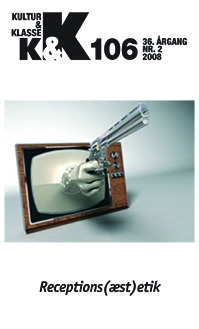Fiktion som restriktion? Eller som indirekte meddelelse?: En diskussion med Dorothy Hale om en etisk vending i nyere litteraturteori
DOI:
https://doi.org/10.7146/kok.v36i106.22023Nøgleord:
Fiktion, restriktion, indirekte, meddelelse, En diskussion, Dorothy Hale, en etisk vending, nyere litteraturteoriResumé
Fiction as Restriction? Or as Indirect Communication? A Discussion with Dorothy Hale about an Ethical Turn in Recent Literary Theory:
This article is a discussion with a recent article by Dorothy Hale: »Fiction as Restriction: Self-Binding in New Ethical Theories of the Novel«. Here, Hale claims that different new ethicists among contemporary literary scholars all end up sounding very much like the Wayne Booth of The Rhetoric of Fiction. In this connection, she points out that the reader’s willing surrender to the fictitious universe of a novel and making room for the characters he or she encounters there – the »self-binding« of her title – is a common ideal of these new ethicists, since it is an exercise in appreciating and making room for otherness as such. The argument of this article, however, is that three of the ethicists Hale discusses, Lynne Huffer, Judith Butler and J. Hillis Miller, do in fact not sound that much like Booth, since Booth does not acknowledge the problems of difference, irony and translation that they, in different ways, address. Instead, it is argued that Kierkegaard’s idea and practice of »indirect communication« seems to be a more convincing, even if somewhat subterranean, common denominator for these critics. Henry James and Walter Benjamin, too, are invited to take part in the discussion.
Downloads
Publiceret
Citation/Eksport
Nummer
Sektion
Licens
Tidsskriftet følger dansk ophavsret.


